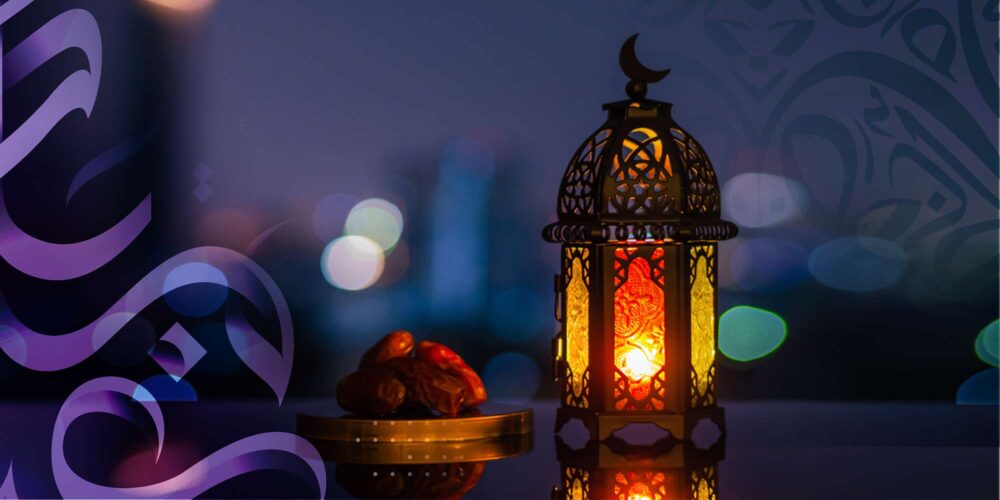Holy month of Ramadan

Table of contents
The Quranic verse says (The month of Ramadhan [is that] in which was revealed the Qur’an, a guidance for the people and clear proofs of guidance and criterion), so the blessed month is the one in which the first verses of the Holy Qur’an were revealed to the Prophet Muhammad, peace be upon him. It is the (ninth) month in the Hijri calendar, and it is determined by tracing the crescent at the end of the month of Sha`ban, fasting is obligatory for every adult, sane, and able Muslim.
Information about the holy month of Ramadan
The month of Ramadan comes after the end of the month of Sha’ban after tracing and verifying the crescent, and the beginning of the holy month will be when the crescent is full, the holy month may be 30 or 29 days.
The honorable hadith says, (Islam is founded on five (pillars): testifying the fact that there is no god but Allah, establishment of prayer, payment of Zakat, fast of Ramadan and Pilgrimage to the House), therefore, fasting in the holy month is one of the foundations of Islam. It is obligatory, like prayer, for every adult, sane, and able Muslim
The Noble Qur’an was revealed to the Prophet Muhammad, may God’s prayers and peace be upon him, in the holy month of Ramadan in the thirteenth year before the Hijrah, specifically on Laylat al-Qadr, which Muslims observe in the odd nights of the last ten days of the holy month, and it has not been specified.
Muslims await the holy month of Ramadan in all parts of the earth with joy and preparations to perform more acts of worship and keep away from sins in the hope of increasing the reward with God and erasing bad deeds, charities also increase during the holy month among all Muslims in all parts of the world.
In an honorable hadith, the Prophet Muhammad, peace and blessings be upon him, said (the Umrah during Ramadan is equal to the performance of Hajj with me), the reward of Hajj is the erasure of all sins, as the pilgrim returns as pure of his sins as the day his mother gave birth to him. Therefore, performing Umrah in Ramadan is completely equivalent to the reward of Hajj, but its performance does not waive the obligation to perform the Hajj for those who are able.
Laylat al-Qadr
This night in particular is of great importance to all Muslims, and they wait for it and investigate it in the odd nights in the last third of the month, as prayers are answered and sins are forgiven on this night, and a whole surah was revealed in the Holy Qur’an that talks about this night, which is (Surah Al-Qadr), and it says:
In the name of God, the Most Gracious, the Most Merciful
“Indeed, We sent the Qur’an down during the Night of Decree (1), And what can make you know what is the Night of Decree? (2), The Night of Decree is better than a thousand months. (3), The angels and the Spirit descend therein by permission of their Lord for every matter (4), Peace it is until the emergence of dawn (5).”
“God Almighty has spoken the truth”
This noble surah explains everything related to this night, as it says that the Noble Qur’an was revealed on this blessed night, the verb and pronoun refer to God Almighty and in the plural form to glorify the status of the Creator, the most exalted of all, it also mentions that the status or value of this night is great, its reward is better than hundreds of months (better than a thousand months), and the virtue of this night continues until dawn.
As mentioned in the surah, the angels descend on the earth on this night, and their number is like pebbles, they spread over the earth to say “Amen” to the Muslims pray until the onset of dawn.
In the last third of the month, Muslim men may stay in mosques under the name of (Iʿtikāf), in order to allocate all the time for worship and praying in this blessed night without having anything to distract them, and to seek the virtue of Laylat al-Qadr for sure.
The date of this night has not been determined so that Muslims strive to pray, worship and seek forgiveness. The prayer of this night is “O Allah, indeed you are pardoning and generous; you love to pardon, so pardon us”, it is the supplication that God inspired Aisha, may God be pleased with her, to say.
One of the signs of this blessed night is that its weather is mild, not hot or cold, and the sun rises in the morning without rays and the sky is clear, Abdullah Ibn Abbas reported: the Prophet, peace and blessings be upon him, said regarding the Night of Decree, “It is a calm night, neither hot nor cold, and the sun arises on it red and feeble.”
The stages of the holy month of Ramadan
- The first ten days of Ramadan: They are called the days of mercy. God’s mercy descends during these days on the hearts of faithful Muslims who desire to be closer to God. In order to acquire God’s mercy, Muslims must give alms to the needy, and it is preferable that the charity be in the form of money, and it is obligatory for them to keep contact with Kinship, as the Messenger said (Those who are merciful will be shown mercy by Allah).
- The second ten days of Ramadan: are called the days of forgiveness. History recorded many victories for Muslims during the second ten days of the holy month, such as their victory in the Battle of Badr, and it is recommended to perform many acts of worship during this period because it is a period of erasure of sins and forgiveness.
- The last ten days of Ramadan: They are called the days of salvation from hell. The virtues of these days increase from the previous ones, and Muslims await the Night of Decree, during which deeds are collected and the Muslims receives forgiveness and salvation from Hell.
Permissibility of breaking the fast in Ramadan
- Illness and travel: God Almighty said in Surat Al-Baqarah verse (184) “if any of you is ill or on a journey, the same number (should be made up) from other days”, this verse makes it permissible for a sick person to break the fast, because fasting may be difficult for him and cause him complications, and the Muslim should fast these days when he is cured, in the case of travel, it is permissible to break the fast in the event that fasting will cause exhaustion, or if this travel is long distances by arduous means, but in light of global progress and the availability of all amenities, a Muslim may not need to break the fast because he may not make an effort. In the old days, the means of travel was camels, for example, and the traveler is exposed to the hardship of travel from high temperature, sweating, etc., so it is permissible for him to break his fast in this case, and in the case of breaking the fast, he must fast these days after the end of his travel and the holy month.
- Menstruation and postpartum: Fasting is forbidden for women in these two cases, and they must make up these days after the end of the holy month, unlike prayer, as the obligation to pray is also waived for women in these two cases, but they are not required to make it up.
- Pregnancy and breast-feeding: In some cases, a woman may be able to fast if this does not harm her or her fetus, after consulting the doctor, but if the doctor advised her not to fast, she must fast these days after the end of her pregnancy, regarding the breastfeeding, fasting may cause a lack of milk for the child due to the lack of fluids in the body, and therefore the breastfeeding woman is allowed to break the fast, and she must also fast these days later.
In all cases, a Muslim is required to consult religious scholars to know if it is enough to fast only, or should offer expiation as well.
Best deeds in the holy month of Ramadan
The worshipers draw near to their Lord during the holy month with a desire to erase sins and earn the reward, and not only to draw closer to God by doing acts of worship, but rather by doing good, helping the needy, keeping contact with Kinship, and others.
- Prayer and Fasting: Prayer and fasting are obligatory for every adult, sane, and able Muslim, male and female, through these deeds, the worshipers draw closer to God, as God forgives sins and answers prayers.
- Reciting the Holy Qur’an: The Prophet Muhammad, may God’s prayers and peace be upon him, used to recite the Holy Qur’an a lot but even more during the holy month of Ramadan, as reading a letter from the Holy Qur’an is equivalent to 10 good deeds, so the worshipers approach their Lord during the holy month through their recitation of the Holy Qur’an.
- Zakat: It is one of the five pillars of Islam, the reward of paying zakat is doubled during the holy month.
- Waiting for Laylat al-Qadr: Worshiping in Laylat al-Qadr and increasing good deeds in it doubles the reward of a Muslim, as it is better than a thousand months.
- keeping contact with Kinship: on the authority of Abu Hurairah, the Prophet Muhammad said (Whoever believes in God and the Last Day, let him uphold his ties of kinship), the virtue of keeping contact with Kinship is great as it increases one’s livelihood, and therefore it is one of the reasons for doubling the reward during the holy month.
These deeds should not be limited to the month of Ramadan only, but a Muslim must do them as much as he can throughout his life.





